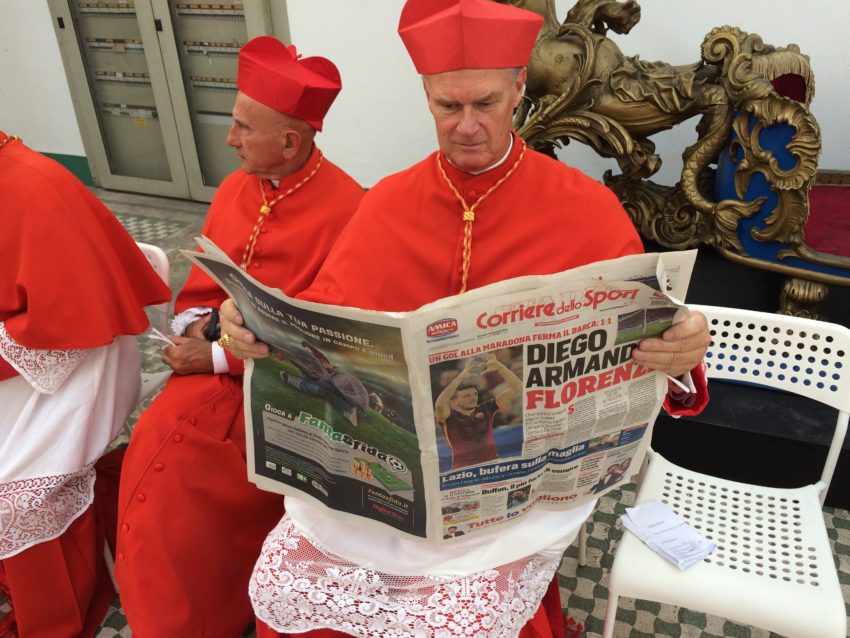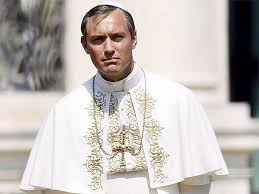Singing “Our Father” in Latin on camera is too much for this extra in “The Young Pope”

(This is the second of a three-part blog on my participation as an extra in “The Young Pope,” the 10-part cable TV series starring Jude Law and Diane Keaton. It opened Oct. 21 in Italy and last week around much of the rest of Europe. It begins in the United States Jan. 15.)
The voice blares out of a loudspeaker and fills the makeshift Sistine Chapel with sound so sweet it’s nearly dripping with Nutella. It’s a high-pitched soprano that emphasizes every syllable of the tongue-twisting phrase “Kyrye Eleison.” It’s a highly trained professional, weaned on voice training from the bowels of the Vatican.
In five seconds I have to join the chorus. And I am petrified.
Have you ever read Latin? It reads like something off an Egyptian wall. It’s a language nearly as dead as Gaelic. Even the Catholic Church campaigned to bring it back into services around the world.
Now try memorizing it.
Now try singing it.
Now try singing it for TV cameras which are currently showing it to millions of people around Europe and, starting Jan. 15, the United States.
It is my second scene of my “acting” debut. I am one of 120 men dressed like Vatican cardinals inside a hangar-sized studio in Cinecitta, Rome’s legendary old movie complex. We’re filming “The Young Pope,” an expected blockbuster 10-part TV series by HBO, Sky and Canal+ set. Jude Law plays the first American pope, a kid from the streets of New Jersey who takes the church by the throat and strangles it into extreme right-wing doctrine.
I play a tall American cardinal, part of the red blur you’ll see in the background when Law speaks to us inside the makeshift Sistine Chapel. Life’s journeys can lead you down so many unexpected paths. However, this one I’m standing on, terrified, is something more foreign than the Latin language. I don’t like music, I obviously don’t like to sing and I’m an atheist. So what am I doing dressed like a Vatican cardinal ready to sing a Latin prayer?
In actuality, my voice won’t be heard on Sky or HBO — much to the relief of millions of viewers and, obviously, Sky and HBO. All our voices will be dubbed by professionals like the one I hear launching our chorus. However, we all are expected to know the prayer well enough to fake it. In other words, they don’t want closeups of two cardinals whose lips are moving in different directions, like an argument in a silent movie.
I take it all to mean I must memorize it. The prayer is “Pater Noster” or “Our Father.” Every Catholic in the world has recited it. (“Our father who art in heaven, hallowed be thy name …”) I was raised Presbyterian and haven’t been in a church other than to view art or escape Rome’s searing summer heat since the eighth grade. And I only went then because I heard cute girls were going on an upcoming church retreat.
Memorizing a Latin prayer is problematic. I have the short-term memory of a begonia. “Pater Noster” is 10 lines of words I’ve never seen before. Memorize them? I can barely memorize my ATM pin number. I read the prayer during rehearsal and tell cardinals around me, “This is impossible. I could spend three or four years and never memorize this.” Next to me is a Peruvian-raised Catholic and an elderly Brit who learned Latin in school. They memorized it over breakfast. “Education is an amazing thing,” the Brit says in a not-so-subtle jab at my American upbringing.
But I try. Even if he does exist, Lord knows I try. A Roman friend suggests I translate it into English to get the meaning. Then translate it into Italian for word association. That helps. However, it doesn’t help me look up into the massive void of a movie set and sing, “… sicut dimittimus debitoribus nostris” (“Forgive us our tresspasses as we forgive those who tresspass against us.”) or “Panem nostrum quotidianum da nobis hodie” (“Give us this day our daily bread.”). I’ve communicated better in rural Taiwan.
I spend three days trying to memorize 10 lines. With a tape of the background music and professional chorus as a guide, I sit at my writing desk and go over it 50 times. I put away the music sheet and try to recite it. I can’t get past “Pater Noster.” In fact, I can’t even remember the name of the prayer, which is “Pater Noster.” I read it on buses and subways. I go to the Roma-Barcelona soccer match and read it before kickoff.
Finally, I’m standing on the set, facing Jude Law who’s sitting regally in outrageous papal robes waiting for us to sing. I have somewhat memorized the first seven lines. I’m winging the rest. I figure the amount of time the camera could be on me won’t be long enough for a viewer at home to open a bottle of beer. I do fine. Not that anyone would know. I am not raising his voice more than a whisper.
We do four takes before an hour break for lunch. Afterward, Oscar-winning director Paolo Sorrentino (“The Great Beauty”) shocks us all by wanting two more takes. This time, he wants the cameras doing close-ups of the cardinals singing on the left side and then the cardinals across the aisle on the right side. I’m on the right side and try to recall the prayer. I can’t. I can’t even remember the first line. I panic. I’m thinking, out of protest, when the camera is on me I’ll lip sync “Vaffanculo,” which is Italian for “Go fuck yourself.” I just want to see if HBO’s editors are asleep at the switch.
I survive. I remember enough lines to open my mouth big and wide and hold it in place during the song’s extension of certain syllables for five seconds or more. On camera, I must look like a grouper.

My biggest shock about movie production is how mind-numbingly boring it can be. It takes two hours to get 120 cardinals dressed and ready to march into a set like traveling minstrels. Tourists taking our picture on Cinecitta tours are sometimes all that breaks the monotony. We sit waiting for cameras to change, for scenes to change.
In the meantime, cliques have formed. The College of Cardinals is intended to represent a melting pot of the world’s 1.2 billion Catholics. And we all look right out of central casting which, essentially, we are. Our cast of extras include squat Indians, dark Hispanics, ancient Italians, slight Asians, muscular Africans and tall Americans. In one scene I stand next to an Asian with a Fu Manchu whom I swear is Ho Chi Minh.
Naturally, we all gravitate to our own language. There are four American extras: John, the husky Chicago native with the Santa Claus beard; Jeff, a Nordic-looking NATO researcher and Air Force grad; Charles, the African-American musician from Alabama; and me. We hang out in our red cardinal outfits like a flock of robins and discuss the American presidential race, our childhoods and Rome’s complete inability to make a service call on time.
The other day, I’m telling John about a new Romanaccio word I learned: fucsia. It means flaming homosexual. It came up in our discussion about the hairdresser. That morning the hairdresser told me he saw me Sunday on the train from Milan. I had no problem with that. I did have a problem with him telling me that while his hand was on my knee.
Jeff has also had some comments made to him, something about the guy lovin’ a man in uniform.

Once we’re out of his lair, we actually see some acting. After our butchering of “Pater Noster” mercifully ended, Jude Law settles in. He is addressing the College of Cardinals. He is essentially giving the State of the Vatican address. On our third day filming, we finally hear some English.
I won’t give away what he says. I don’t want to take away from a story line that has me glued to my TV here in Rome every Friday night. I will tell you that Law is the most remarkable actor I’ve ever seen. Granted, this is my extra role but to watch his professionalism, his poise, his bonding with the character is mind spelling. His character is one of a kid off the New Jersey streets who grows up to be pope. Not to stereotype kids off New Jersey streets, but for the first time in papal history, the pope is a dick. He is heavy handed, obsessed and downright mean.
Adding to his mastery is he’s doing it with a New Jersey accent. He isn’t using the grossly overdone stereotypical New Joisey bent, but it’s much more subtle. It’s hard. Pointed. It’s definitely off the streets. He says, “I want fanatical BELIEVAHS!” He has made me believe. We did six takes of a five-to-10-minute speech, using different camera angles, and he nailed every line every time. He’s like a machine, a machine with a heart and a soul and a conviction that makes me look at him and forget he’s Jude Law, the actor. I look at him and see the American pope.
In the first take, one of cardinal’s cell phones went off. He turned it off. It went off AGAIN. After the scene, Law calmly and evenly said, back in his high-end British brogue, “Whomever’s cell phone went off, find it. Or I’ll find you.”
I’ve never enjoyed so much working for free.


November 3, 2016 @ 1:34 pm
The only thing that stopped me from going into theatre was the endless hours devoted to make-up, wardrobe, and waiting around. But i was in college, ignorant and didn’t understand the process and was too easily discouraged by a woman from the community who thought it her duty to come on set and discourage college students who didn’t know any better. Now so many years later looking back, life is make-up, wardrobe, and waiting around!
November 4, 2016 @ 4:42 am
Yes, Sandra, sometimes art imitates life too much. I’m glad I did it. But I won’t do it again unless I’m paid.